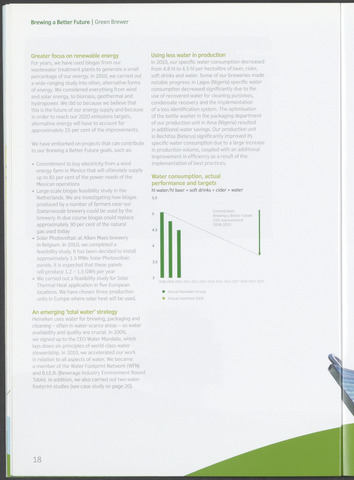Using less water in production
18
Brewing a Better Future Green Brewer
Greater focus on renewable energy
For years, we have used biogas from our
wastewater treatment plants to generate a small
percentage of our energy. In 2010, we carried out
a wide-ranging study into other, alternative forms
of energy. We considered everything from wind
and solar energy, to biomass, geothermal and
hydropower. We did so because we believe that
this is the future of our energy supply and because
in order to reach our 2020 emissions targets,
alternative energy will have to account for
approximately 25 per cent of the improvements.
We have embarked on projects that can contribute
to our Brewing a Better Future goals, such as:
Commitment to buy electricity from a wind
energy farm in Mexico that will ultimately supply
up to 85 per cent of the power needs of the
Mexican operations
Large-scale biogas feasibility study in the
Netherlands. We are investigating how biogas
produced by a number of farmers near our
Zoeterwoude brewery could be used by the
brewery. In due course biogas could replace
approximately 30 per cent of the natural
gas used today
Solar Photovoltaic at Aiken Maes brewery
in Belgium. In 2010, we completed a
feasibility study. It has been decided to install
approximately 1.5 MWe Solar Photovoltaic
panels. It is expected that these panels
will produce 1.2 -1.5 GWh per year
We carried out a feasibility study for Solar
Thermal Heat application in five European
locations. We have chosen three production
units in Europe where solar heat will be used.
In 2010, our specific water consumption decreased
from 4.8 hi to 4.5 hi per hectolitre of beer, cider,
soft drinks and water. Some of our breweries made
notable progress: in Lagos (Nigeria) specific water
consumption decreased significantly due to the
use of recovered water for cleaning purposes,
condensate recovery and the implementation
of a loss identification system. The optimisation
of the bottle washer in the packaging department
of our production unit in Ama (Nigeria) resulted
in additional water savings. Our production unit
in Rechitsa (Belarus) significantly improved its
specific water consumption due to a large increase
in production volume, coupled with an additional
improvement in efficiency as a result of the
implementation of best practices.
Water consumption, actual
performance and targets
hi water/hi beer soft drinks cider water
5.5
Commitment
Brewing a Better Future
25% improvement
2008-2020
4.5
3.5
2008 2009 2010 2011 2012 2013 2014 2015 2016 2017 2018 2019 2020
Actual Heineken Group
Actual reported 2008
An emerging 'total water' strategy
Heineken uses water for brewing, packaging and
cleaning - often in water-scarce areas - so water
availability and quality are crucial. In 2009,
we signed up to the CEO Water Mandate, which
lays down six principles of world-class water
stewardship. In 2010, we accelerated our work
in relation to all aspects of water. We became
a member of the Water Footprint Network (WFN)
and B.I.E.R. (Beverage Industry Environment Round
Table). In addition, we also carried out two water
footprint studies (see case study on page 20).

